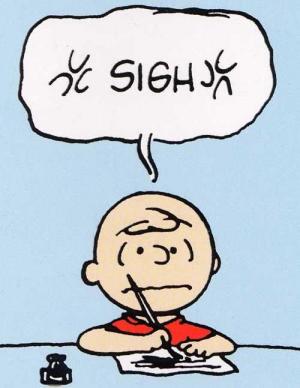Ah, criticism. It is the architecture of the scientific process. Manuscripts are written describing hypothesis of the way we think the world works. But before our hypothesis can be transmitted to the world, we must submit these little pieces of ourselves to others to rip to shreds.
After we’ve re-written the manuscript a few times until it vaguely resembles the work of art we created before, we must submit it to a whole new group of ‘criticizers’, aka reviewers.
Where they commence to rip it to shreds as well.
If we’re lucky, when writing this manuscript (and hopefully 10 others) we discover a hole in the literature. And some twisted part of our brain thinks it would be a fantastic idea to spend six months, weekends and evenings included, turning that ‘hole in the literature’ into a 100-page document of why you are the best researcher ever and will cure all of the world’s ills with this one research project, aka a ‘grant proposal’.
Where they won’t even bother to rip it to shreds. They will only tell you that it did not score high enough to be ripped to shreds.
As you may or may not be able to tell…I hate criticism.
During my student days, I used to loath the days I would receive feedback from my mentor; praying that at least one page wouldn’t be covered in red track changes. Sometimes I would have day dreams where papers were returned to me in their original black-and-white pristine condition with only a note on top saying, “This is fantastic! You must submit this to the Lancet at once!”
But then something happened. My dream came true! (Well, minus the Lancet comment.) I sent out a paper to co-authors and most were returned with nary a comment. I started to think that maybe all of those hours of writing and re-writing and re-re-writing were starting to pay off. Maybe something had clicked in my brain over the last fortnight to push me from a ‘so-so writer’ into a ‘fantastic writer’. Malcolm Gladwell, eat your heart out.
Well, you can guess what happened when I submitted the paper to a journal.
It was rejected.
*cue copious weeping*
But seriously, there was definitely a lesson here: Lots and lots of criticism and feedback from mentor and co-authors equaled acceptance. Little to no criticism from mentor and co-authors equaled rejection.
No, the lesson is not that I suck as a writer and should take up a profession in travel photography instead (although this does sound quite attractive in the middle of a second revise and resubmit).
What I drew from this is that sometimes *wait for it* criticism can be a good thing. That criticism is an opportunity in disguise. A way for others to point out the weaknesses in our work, not because they hate us or think our work is appalling, but because they want to help us make it better. Or at least that’s the way I like to think about it.
For those new to this way of thinking, I present both my ‘old’ and ‘present’ way of reacting to certain criticisms:
1. The Grammar Police have gone through my paper with a vengeance. Commas, active verbs, plurals, and future conditional tenses are apparently problems for me.
‘Old’ reaction: Obviously, all previous English Teachers were lacking. I suck.
‘Present’ reaction: Find colleague who is also ‘Grammar Police’ and bribe them to read all future papers.
2. “I don’t understand why you XXX…”
‘Old’ reaction: Obviously, my ability to express my thoughts in plain English is lacking. I suck.
‘Present’ reaction: Realize that I didn’t do a good job of explaining that section. Read it out loud to myself. Or have someone read the section who has never read it before. Like my mother. Oh wait, she has heard it like 50 times before…on to the next guinea pig…
‘Old’ reaction: Obviously, my ability to express my thoughts in plain English is lacking. I suck.
‘Present’ reaction: Realize that I didn’t do a good job of explaining that section. Read it out loud to myself. Or have someone read the section who has never read it before. Like my mother. Oh wait, she has heard it like 50 times before…on to the next guinea pig…
3. “Have you thought about this? Or tried this? What happens?”
‘Old’ reaction: Great, there goes my weekend running all of this analysis over again. They suck.
‘Present’ reaction: Ah, I didn’t think of that. Doing this extra work will help me better understand the patterns in my data.
4. “… [no comments]”
‘Old’ reaction: I am a genius.
‘Present’ reaction: Hm, I need to find someone to read this who is willing to rip me to shreds. My paper will be much better for it.



No comments:
Post a Comment